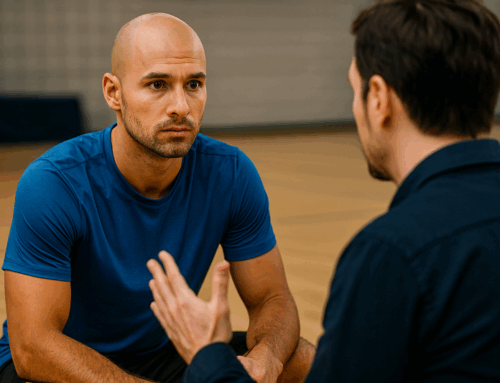The Mental Aspect in Coaching
While coaches possess numerous skills (technical, tactical, leadership, communication, etc.), the role of the mental and psycho-pedagogy are equally essential for them to perform effectively.
In this context, we distinguish two levels of skills:
- The coach’s own mental abilities: their capacity to manage stress and pressure, their motivation, their ability to focus on coaching and tactical analysis, etc.
- The “mental coaching” of their players: the ability to calm or energize the team, motivate players, instill self-confidence, enhance team cohesion, manage crisis situations, etc.
Integrating Mental Aspects in Coaching
Sports psychologists and mental trainers have delved into techniques or attitudes that coaches can integrate into their relationship with athletes, with the aim to:
- motivate players more effectively
- boost their self-confidence
- forge unity toward common objectives
- calm them during stressful or high-pressure moments
- foster a group dynamic that enhances learning and performance
Coaches are essentially the primary “mental trainers” of their players, as they are in direct daily contact with them.
When stress, loss of self-confidence, or demotivation arise, the coaches’ behaviors become crucial in assisting the athlete(s) in expressing their best. Hence, it’s logical that they develop abilities to, for instance, calm their group or evoke other key mental skills for performance.
Being Mentally Well to Optimize Coaching
If the coach is mentally well, they can maximize their potential. Just as a player can underperform or conversely express all their abilities on the field due to mental reasons, a coach can lose control of their emotions and focus and become less effective.
If they are mentally sound, motivated, aware of their capabilities, composed, and confident in their analyses and decisions, they will be capable of intervening positively and effectively, and also handle pressure moments more efficiently.
Role of Mental Trainer in Coaching
The role of the mental trainer here is to assist the coach:
-
- in achieving a mental state conducive to expressing their full potential, enabling them to exhibit their technical, tactical, communication, leadership, etc., skills. At this level, work on pre-match routines, preparing pep talks, and utilizing tools to activate specific mental states (mental relaxation, confidence, motivation, etc.) is commonly practiced. Techniques like cognitive and behavioral methods and mental imagery are often employed.
- in identifying players’ needs in real situations
- in better managing difficult or crisis situations
in training behaviors, attitudes, and concrete tools to strengthen their players’ mental attributes
Coach’s Coaching: Steps
Similar to coaching athletes, this coaching is personalized. It usually comprises a series of steps:
- Needs analysis and goal setting
- Defining evaluation criteria for these goals
- Implementing a series of sessions with exercises
- Integrating changes into training and competitions
- Evaluation (assessment)
More articles related to this theme:




